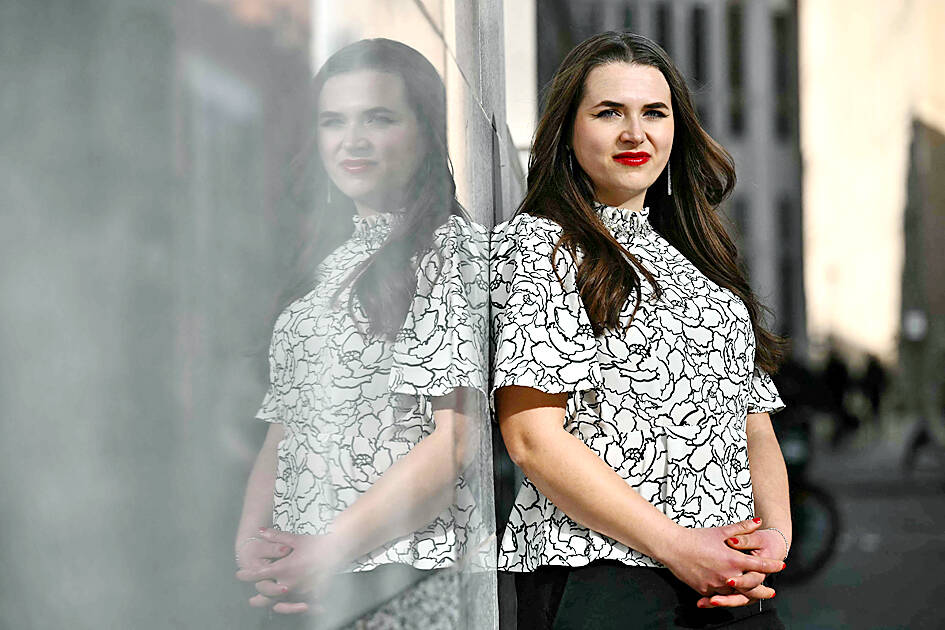Britain’s newest reality TV show has been slammed as “insensitive,” “voyeuristic” and “nauseating” for recreating with six Britons the often fatal journeys made by thousands of refugees to the UK.
Bluntly titled Go Back to Where You Came From, the part-documentary, part-reality TV show by Channel 4 follows the group of six, who hold strong views both for and against immigration.
They are divided into two teams, with one dropped into war-ravaged Raqqa in Syria and the other sent to Mogadishu in Somalia. Over four episodes, which launched on Monday last week, they “experience some of the most perilous parts of the refugee journeys” according to Channel 4 — although they travel largely in armored vehicles.

Photo: AFP
The outspoken views of some participants, as well as the show’s format, have been criticized by viewers, charities and some media.
Amnesty International UK called it “deeply disappointing” and “sensational.”
Participant and chef Dave Marshall, 35, opened the series standing on the cliffs of Dover, calling for immigrants crossing the Channel to be “blown up.”
Moments later, political commentator Chloe Dobbs, 24, says that unless immigration is reined in “Britain will be a hellhole full of people wearing burqas.”
In the first episode, the six are taken to markets where they meet families, play soccer with kids and accompany them as they search through litter for scraps.
At one point, when they visit a bombed-out family home in Raqqa, Marshall and two other participants are invited to stay the night.
“Very kind of you for offering your house to us,” Marshall said.
“The series explores the varied and sometimes polarized opinions in our society in a fresh way,” a series spokesperson said.
In upcoming episodes, both groups undertake “challenges,” including a boat crossing and trekking through a Libyan desert.
The reality TV genre “exists and its success depends on actually performing shocking opinions,” said Myria Georgiou, media and communications professor at the London School of Economics.
“I’m sure the contestants are competing for that shock element — who is going to be more extreme in their opinions,” she said.
Dobbs defended it as a “really fun show that lots of people will tune into.”
“More so than just some bog-standard, boring documentary,” she said.
Go Back to Where You Came From is based on a popular Australian series which first ran in the early 2010s.
At around that time, politicians in Australia were campaigning to “stop the boats” of irregular migrants reaching the country.
A decade later, the same catchphrase has been seized upon by politicians opposing asylum seekers crossing the Channel to reach the UK.
The timing of the British version did not surprise Georgiou.
“You have the political leadership, nationally and globally, that have made the most outrageous opinions mainstream,” she said. “We can see that politics have become entertainment and thus it’s no surprise that entertainment has become politics.”
Some viewers have praised Channel 4 for giving a rare primetime spot to the hot-button immigration debate, with British charity Refugee Council “welcoming” the show’s premise.
“Television shows have huge potential to highlight the human stories behind the headlines,” Refugee Council CEO Enver Solomon said.
In one heavily criticized “challenge,” the group get into a dinghy in a simulation of the often fatal Channel crossings.
For Dobbs, who has previously said small boats were made out to be “fun” by some refugees, getting into a flimsy vessel in the middle of the night was a turning point.
“It was that moment for me that it really hit me. Gosh, people must be really desperate to get on these boats,” she said.
However, clips of the simulation sparked outrage across the Channel, with French lawmaker Xavier Bertrand calling for the “nauseating” show to be canceled.
“Hundreds of people have died in the Channel in recent years. This situation is a humanitarian tragedy, not the subject of a game,” Bertrand wrote on X.

ANGER: A video shared online showed residents in a neighborhood confronting the national security minister, attempting to drag her toward floodwaters Argentina’s port city of Bahia Blanca has been “destroyed” after being pummeled by a year’s worth of rain in a matter of hours, killing 13 and driving hundreds from their homes, authorities said on Saturday. Two young girls — reportedly aged four and one — were missing after possibly being swept away by floodwaters in the wake of Friday’s storm. The deluge left hospital rooms underwater, turned neighborhoods into islands and cut electricity to swaths of the city. Argentine Minister of National Security Patricia Bullrich said Bahia Blanca was “destroyed.” The death toll rose to 13 on Saturday, up from 10 on Friday, authorities

Local officials from Russia’s ruling party have caused controversy by presenting mothers of soldiers killed in Ukraine with gifts of meat grinders, an appliance widely used to describe Russia’s brutal tactics on the front line. The United Russia party in the northern Murmansk region posted photographs on social media showing officials smiling as they visited bereaved mothers with gifts of flowers and boxed meat grinders for International Women’s Day on Saturday, which is widely celebrated in Russia. The post included a message thanking the “dear moms” for their “strength of spirit and the love you put into bringing up your sons.” It

In front of a secluded temple in southwestern China, Duan Ruru skillfully executes a series of chops and strikes, practicing kung fu techniques she has spent a decade mastering. Chinese martial arts have long been considered a male-dominated sphere, but a cohort of Generation Z women like Duan is challenging that assumption and generating publicity for their particular school of kung fu. “Since I was little, I’ve had a love for martial arts... I thought that girls learning martial arts was super swaggy,” Duan, 23, said. The ancient Emei school where she trains in the mountains of China’s Sichuan Province

DISASTROUS VISIT: The talks in Saudi Arabia come after an altercation at the White House that led to the Ukrainian president leaving without signing a minerals deal Ukrainian President Volodymyr Zelenskiy was due to arrive in Saudi Arabia yesterday, a day ahead of crucial talks between Ukrainian and US officials on ending the war with Russia. Highly anticipated negotiations today on resolving the three-year conflict would see US and Ukrainian officials meet for the first time since Zelenskiy’s disastrous White House visit last month. Zelenskiy yesterday said that he would meet Saudi Arabian Crown Prince Mohammed bin Salman, the nation’s de facto leader, after which his team “will stay for a meeting on Tuesday with the American team.” At the talks in the Red Sea port city of Jeddah, US